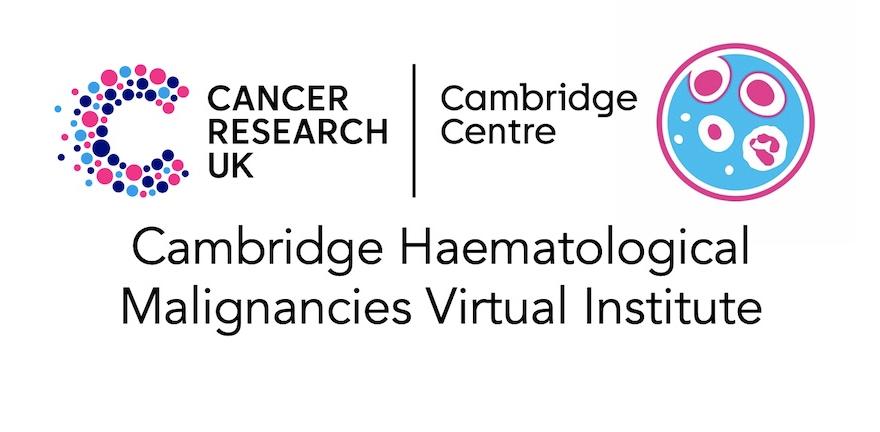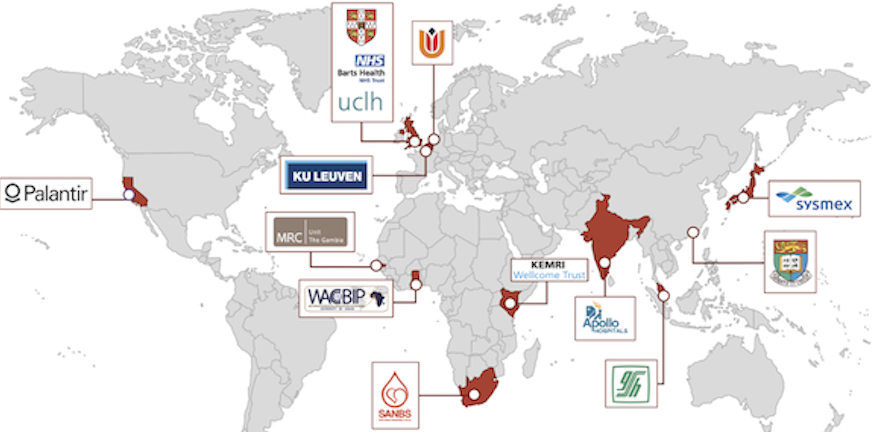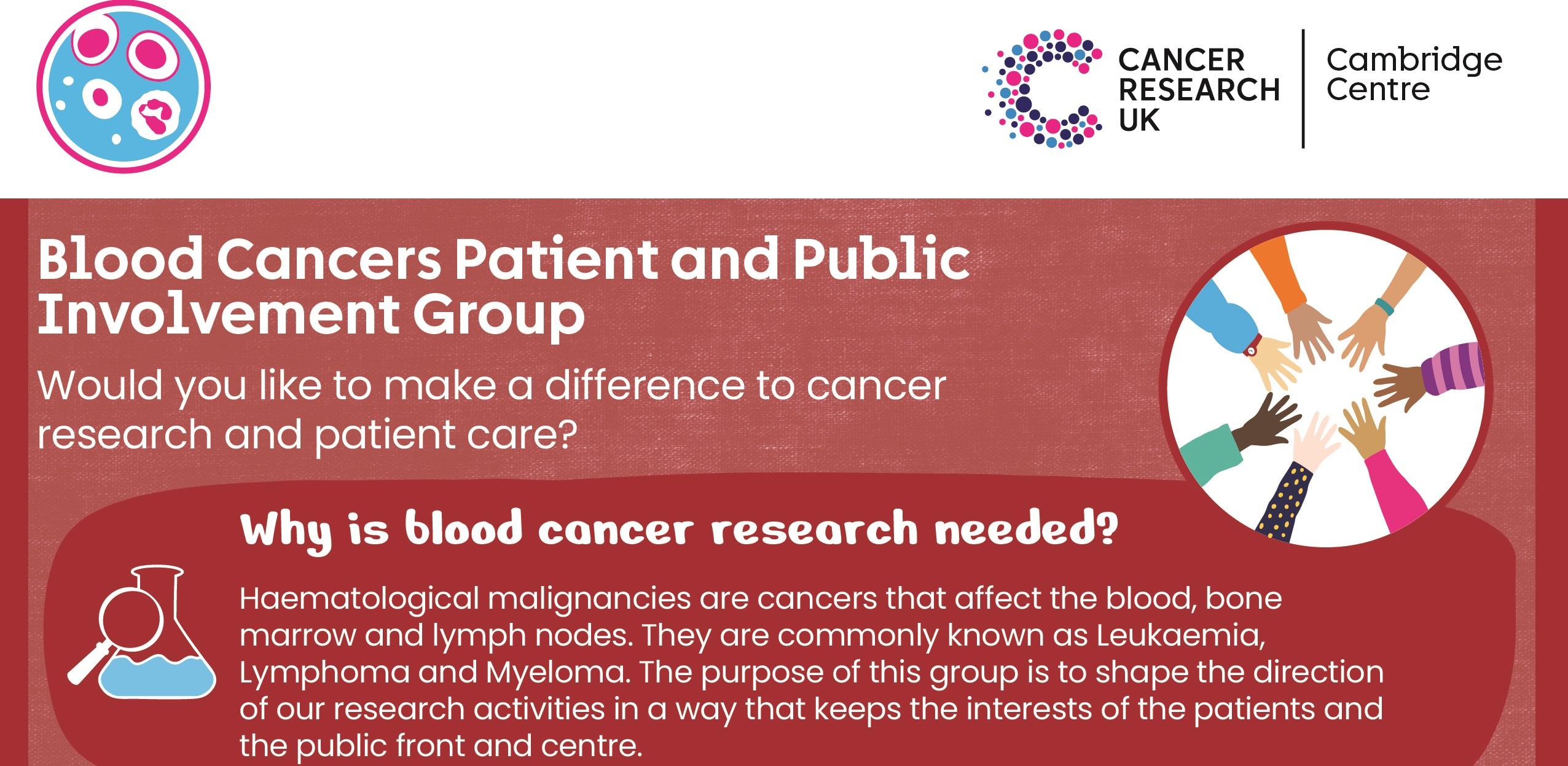The University of Cambridge Department of Haematology is located at the Cambridge Biomedical Campus and the Wellcome Trust Genome Campus. It has laboratories in the Jeffrey Cheah Biomedical Centre, the Cambridge Institute for Medical Research, NHS Blood and Transplant Blood Centre and the Wellcome Sanger Institute. The Head of Department is Professor Brian Huntly.
The department has four main goals:
- To conduct internationally competitive biomedical research.
- To provide education in medical aspects of haematology to undergraduate scientists and medical students.
- To provide postgraduate education, largely through the provision of PhD students.
- To contribute to the clinical activities of the Addenbrooke's Department of Haematology.
Recent publications
Lachowiez CA, Asimomitis G, Bernard E, Devlin SM, Tazi Y, Creignou M, Germing U, Gattermann N, Gilkes A, Thomas I, Bullinger L, Döhner K, Malcovati L, Othman J, Dillon R, Eisfeld AK, Nicolet D, Issa GC, Daver N, Kadia TM, DiNardo CD, Ravandi F, Garcia-Manero G, Montalban-Bravo G, Russell N, Cazzola M, Döhner H, Huntly BJ, Hasserjian RP, Hellström-Lindberg E, Papaemmanuil E, Loghavi S. Multi-Modal and Data-Driven Assessment of Myeloid Neoplasms Refines Classification Across Disease States. Blood Cancer Discov. 2025 Jul 3. doi: 10.1158/2643-3230.BCD-25-0047.
Mitchell E, Pham MH, Clay A, Sanghvi R, Williams N, Pietsch S, Hsu JI, Jung H, Vedi A, Moody S, Wang J, Leonganmornlert D, Spencer Chapman M, Dunstone E, Santarsieri A, Cagan A, Machado HE, Baxter EJ, Follows G, Hodson DJ, McDermott U, Doherty GJ, Martincorena I, Humphreys L, Mahbubani K, Saeb Parsy K, Takahashi K, Goodell MA, Kent D, Laurenti E, Campbell PJ, Rahbari R, Nangalia J, Stratton MR. The long-term effects of chemotherapy on normal blood cells. Nat Genet. 2025 Jul 1. doi: 10.1038/s41588-025-02234-x.
Uryu H, Saeki K, Haeno H, Kapadia CD, Furudate K, Nangalia J, Spencer Chapman M, Zhao L, Hsu JI, Zhao C, Chen S, Tanaka T, Li Z, Ogata S, Hanache S, Yang H, DiNardo C, Daver N, Pemmaraju N, Jain N, Ravandi F, Zhang J, Song X, Thompson E, Tang H, Little L, Gumbs C, Orlowski RZ, Qazilbash M, Bhalla K, Colla S, Kantarjian H, Kanagal-Shamanna R, Bueso-Ramos C, Nakada D, Al-Atrash G, Molldrem J, Futreal PA, Shpall E, Goodell M, Garcia-Manero G, Takahashi K. Clonal evolution of hematopoietic stem cells after autologous stem cell transplantation. Nat Genet. 2025 Jul 1. doi: 10.1038/s41588-025-02235-w.
Lidonnici MR, Chianella G, Mende N, Bastos HP, Barcella M, Merelli I, Storto M, Romeo V, Tiboni F, Scaramuzza S, Rossi C, Raggi L, Aprile A, Crippa S, Iskander D, Roberts I, Karamiditris A, Keith J, Lechauve C, Weiss MJ, Wilson NK, Göttgens B, Bernardo ME, Ciceri F, Aiuti A, Marktel S, Laurenti E, Ferrari G. Imbalanced TGFβ signalling and autophagy drive erythroid priming of hematopoietic stem cells in β-thalassemia. Nat Commun. 2025 Jul 1;16(1):5639. doi: 10.1038/s41467-025-60676-7.
Méndez-Ferrer S. An AI model of transplantation risk for myelofibrosis. Blood. 2025 Jun 26;145(26):3068-3069. doi: 10.1182/blood.2025028816.
Damaskou A, Wilson R, Gozdecka M, Giotopoulos G, Asby R, Eleftheriou M, Gu M, Récher C, Mansat-De Mas V, Vergez F, Sahal A, Vick B, Papachristou EK, Sawle A, Yankova E, Dudek M, Liu X, Russell J, Rak J, Hilcenko C, D'Santos CS, Jeremias I, Sarry JE, Tzelepis K, Huntly BJ, Warren AJ, Tavana O, Vassiliou GS. Posttranscriptional depletion of ribosome biogenesis factors engenders therapeutic vulnerabilities in NPM1-mutant AML. Blood. 2025 Jun 25:blood.2024026113. doi: 10.1182/blood.2024026113.
Theeuwes B, Harland LTG, Bisia AM, Costello I, Ton MN, Lohoff T, Clark SJ, Argelaguet R, Wilson NK, Reik W, Bikoff EK, Robertson EJ, Göttgens B. Eomes directs the formation of spatially and functionally diverse extraembryonic hematovascular tissues. Dev Cell. 2025 Jun 20:S1534-5807(25)00333-8. doi: 10.1016/j.devcel.2025.06.001.
Ruiz-Fernández de Córdoba B, Valencia K, Welch C, Moreno H, Martínez-Canarias S, Zandueta C, Gómez E, Calvo A, Otegui N, Echepare M, Garzón I, Ajona D, Lara-Astiaso D, Guruceaga E, Guembe L, Pío R, Melero I, Vicent S, Pastor F, Martínez-Monge R, Lecanda F. Dual ENPP1/ATM depletion blunts DNA damage repair boosting radioimmune efficacy to abrogate triple-negative breast cancer. Signal Transduct Target Ther. 2025 Jun 13;10(1):185. doi: 10.1182/blood.2025028902.
Gleadall NS, Koets L, Shamardina O, Gollub J, Gottschalk AJ, Razeghi O, Ochoa G, Stephens J, Varma R, Martin J, Allara E, Brown CJ, Daly J, Di Angelantonio E, Grimsley S, Howell WM, Hyvärinen K, Jentsch U, Kingston N, Montemayor C, Moya-Valera C, Ord J, Partanen J, Roberts DJ, Stirrups KE, Vege S, Walker L, Harmer A, Kaushikkar S, Ouwehand WH, van der Schoot CE, Westhoff CM, Veldhuisen B, Lane WJ. Array Genotyping of Transfusion Relevant Blood Cell Antigens in 6946 Ancestrally Diverse Subjects. Blood. 2025 Jun 11:blood.2025028902. doi: 10.1182/blood.2025028902.
Barile M, Chabra S, Isobe T, Gottgens B. diffGEK: differential gene expression kinetics. Bioinformatics. 2025 Jun 2;41(6):btaf316. doi: 10.1093/bioinformatics/btaf316.
Caduc MJ, de Toledo MAS, Koschmieder S, Méndez-Ferrer S. Stem Cell Niche: iPSC-Based Assembloids for Modeling Human Hematopoiesis. Methods Mol Biol. 2025 Jun 4. doi: 10.1007/7651_2025_629.
Garcia-Gimenez A, Ditcham JE, Azazi DMA, Giotopoulos G, Asby R, Meduri E, Bagri J, Sakakini N, Lopez CK, Narayan N, Beinortas T, Agrawal-Singh S, Fung K, O'Connor D, Mansour MR, Alabed HBR, Jenkins B, Koulman A, Murphy MP, Horton SJ, Huntly BJP, Richardson SE. CREBBP inactivation sensitizes B cell acute lymphoblastic leukemia to ferroptotic cell death upon BCL2 inhibition. Nat Commun. 2025 May 20;16(1):4274. doi: 10.1038/s41467-025-59531-6.
Lund S, Gong C, Yu X, Staudt LM, Hodson DJ, Scheich S. Strategies for CRISPR-based knock-ins in primary human B cells and lymphoma cell lines. Front Immunol. 2025 May 16;16:1589729. doi: 10.3389/fimmu.2025.1589729.
Khatib-Massalha E, Di Buduo CA, Chédeville AL, Ho YH, Zhu Y, Grockowiak E, Date Y, Khuat LT, Fang Z, Quesada-Salas J, Carrillo Félez E, Migliavacca M, Montero I, Pérez-Simón JA, Balduini A, Méndez-Ferrer S. Defective neutrophil clearance in JAK2V617F myeloproliferative neoplasms drives myelofibrosis via immune checkpoint CD24. Blood. 2025 May 15:blood.2024027455. doi: 10.1182/blood.2024027455.
Tweedie S, Martin S, Bruford E. Towards an official gene nomenclature for Populus trichocarpa. Tree Physiol. 2025 May 9:tpaf054. doi: 10.1093/treephys/tpaf054.
Krupka JA, Hodson DJ. Class struggle in DLBCL. Blood. 2025 May 1;145(18):1967-1969. doi: 10.1182/blood.2024027995.
|
The NIHR BioResource is a panel of volunteers, with and without health conditions, who will participate in research studies investigating the links between genes, the environment, health and disease enabling scientific discoveries as well as facilitating translational medicine for the benefit of patients.They donate their DNA via a blood or saliva sample which is used together with other information, such as gender, ethnicity, lifestyle and health information to match them to specific research studies. The NIHR Cambridge Centre is one of 13 centres which make up the NIHR BioResource. |
Cambridge Blood and Stem Cell BioBank The Cambridge Blood and Stem Cell Biobank is a tissue bank for samples from patients with haematological malignancies and normal individuals, including cord blood. We are also the repository for the UK Myeloproliferative Disorders (MPD) sample bank, and several clinical trials for this group of disorders. The bank has collected over 15,000 blood and bone marrow-derived samples to date from patients with haematological malignancies and approximately 2600 normal individuals, all curated in a bespoke database designed to facilitate research activities. Existing samples and prospective collections are available to researchers working on ethically approved studies in malignant blood disorders and normal blood development, and 4800 samples have been transferred to researchers both in the UK and internationally. |






